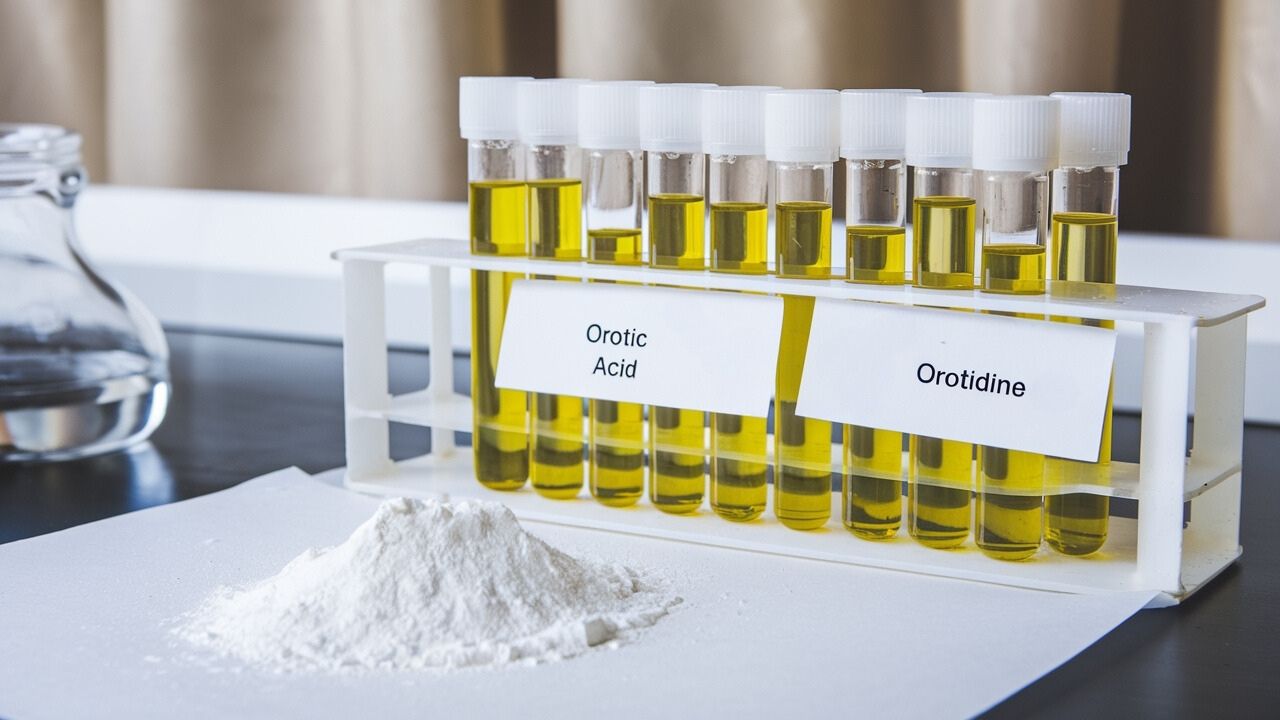
Orotidylic Decarboxylase Deficiency is a rare genetic disorder that affects the body's ability to produce pyrimidines, essential components of DNA and RNA. This deficiency can lead to severe health issues, including developmental delays, anemia, and immune system problems. Understanding this condition is crucial for early diagnosis and effective treatment. In this blog post, we'll explore 25 intriguing facts about Orotidylic Decarboxylase Deficiency, shedding light on its causes, symptoms, and potential treatments. Whether you're a medical professional, a student, or someone curious about rare genetic disorders, these facts will provide valuable insights into this complex condition.
Key Takeaways:
- Orotidylic Decarboxylase Deficiency is a rare genetic disorder causing developmental delays, anemia, and growth issues due to enzyme deficiency. Treatment focuses on managing symptoms and ongoing research offers hope for future treatments.
- Living with Orotidylic Decarboxylase Deficiency can be challenging, but support groups, educational resources, and advocacy efforts can help individuals lead fulfilling lives with proper management and support.
What is Orotidylic Decarboxylase Deficiency?
Orotidylic Decarboxylase Deficiency is a rare genetic disorder affecting the body's ability to produce pyrimidines, essential components of DNA and RNA. This condition can lead to various health issues, including developmental delays and anemia. Here are some intriguing facts about this rare disorder.
-
Genetic Origin: Orotidylic Decarboxylase Deficiency is caused by mutations in the UMPS gene, which is responsible for producing the enzyme orotidine 5'-phosphate decarboxylase.
-
Enzyme Deficiency: The disorder results from a deficiency of the enzyme orotidine 5'-phosphate decarboxylase, crucial for pyrimidine synthesis.
-
Pyrimidine Synthesis: Pyrimidines are vital for DNA and RNA production, making this enzyme essential for cell division and growth.
-
Autosomal Recessive: This condition is inherited in an autosomal recessive manner, meaning both parents must carry the mutated gene for a child to be affected.
-
Rare Disorder: Orotidylic Decarboxylase Deficiency is extremely rare, with only a few documented cases worldwide.
Symptoms and Diagnosis
Understanding the symptoms and how this condition is diagnosed can help in early detection and management.
-
Developmental Delays: Children with this deficiency often exhibit developmental delays, including delayed speech and motor skills.
-
Anemia: One of the hallmark symptoms is megaloblastic anemia, characterized by the presence of abnormally large red blood cells.
-
Growth Retardation: Affected individuals may experience growth retardation, resulting in shorter stature compared to their peers.
-
Neurological Issues: Some patients may suffer from neurological problems, including seizures and intellectual disabilities.
-
Urinary Orotic Acid: Elevated levels of orotic acid in the urine are a key diagnostic marker for this disorder.
-
Genetic Testing: Confirming the diagnosis often involves genetic testing to identify mutations in the UMPS gene.
Treatment and Management
While there is no cure, various treatments can help manage the symptoms and improve the quality of life for those affected.
-
Uridine Supplementation: Uridine supplements can help bypass the metabolic block caused by the enzyme deficiency.
-
Folic Acid: Folic acid supplements may be prescribed to help manage anemia and support overall health.
-
Vitamin B12: Vitamin B12 supplements can also be beneficial in treating megaloblastic anemia associated with this condition.
-
Regular Monitoring: Regular medical check-ups are essential to monitor growth, development, and overall health.
-
Dietary Adjustments: Some patients may benefit from specific dietary adjustments to support their metabolic needs.
Research and Future Directions
Ongoing research aims to better understand this rare disorder and develop more effective treatments.
-
Gene Therapy: Scientists are exploring gene therapy as a potential treatment to correct the underlying genetic mutation.
-
Enzyme Replacement: Research is being conducted on enzyme replacement therapies to provide the missing enzyme directly.
-
Clinical Trials: Various clinical trials are underway to test new treatments and improve existing ones.
-
Patient Registries: Establishing patient registries can help gather more data and improve understanding of the disorder.
-
Awareness Campaigns: Raising awareness about Orotidylic Decarboxylase Deficiency can lead to earlier diagnosis and better support for affected families.
Living with Orotidylic Decarboxylase Deficiency
Living with a rare genetic disorder can be challenging, but with the right support and resources, individuals can lead fulfilling lives.
-
Support Groups: Joining support groups can provide emotional support and valuable information for affected families.
-
Educational Resources: Access to educational resources can help families understand the disorder and manage it effectively.
-
Advocacy: Advocacy efforts can help improve access to medical care and support services for those affected by rare genetic disorders.
-
Quality of Life: With proper management and support, individuals with Orotidylic Decarboxylase Deficiency can achieve a good quality of life.
Final Thoughts on Orotidylic Decarboxylase Deficiency
Orotidylic Decarboxylase Deficiency is a rare genetic disorder that affects the body's ability to produce pyrimidines, essential for DNA and RNA synthesis. This deficiency can lead to severe developmental delays, anemia, and immune system problems. Early diagnosis and treatment are crucial for managing symptoms and improving quality of life. Genetic testing can help identify the disorder, allowing for timely intervention. Treatment often involves supplementation with uridine, which can help bypass the metabolic block caused by the enzyme deficiency. While research is ongoing, understanding this condition better can lead to more effective therapies in the future. Awareness and education about Orotidylic Decarboxylase Deficiency are vital for healthcare professionals and families affected by this disorder. By staying informed, we can support those living with this condition and work towards better outcomes.
Frequently Asked Questions
Was this page helpful?
Our commitment to delivering trustworthy and engaging content is at the heart of what we do. Each fact on our site is contributed by real users like you, bringing a wealth of diverse insights and information. To ensure the highest standards of accuracy and reliability, our dedicated editors meticulously review each submission. This process guarantees that the facts we share are not only fascinating but also credible. Trust in our commitment to quality and authenticity as you explore and learn with us.
